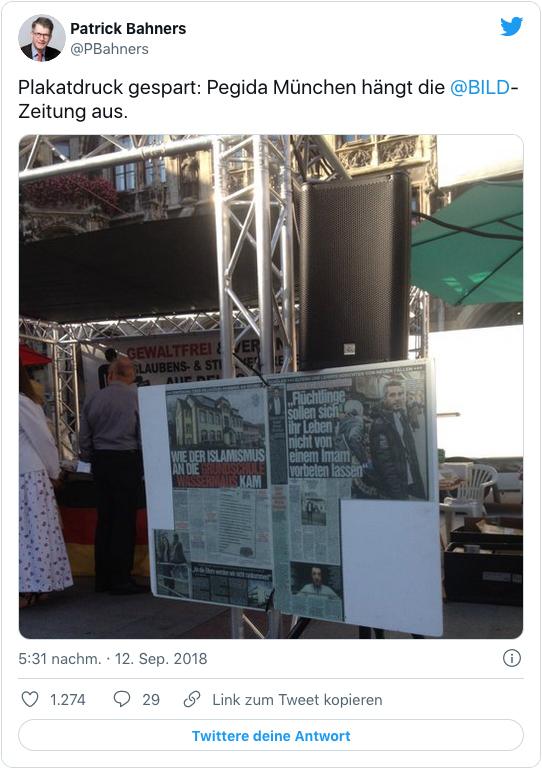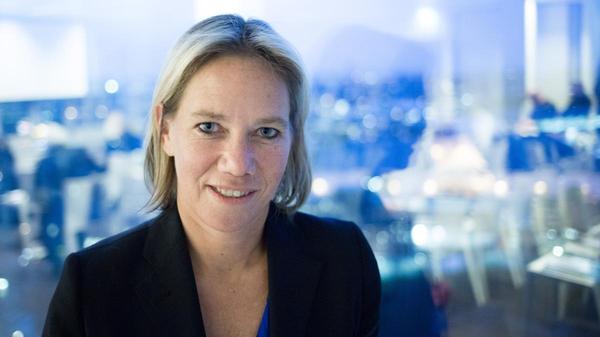
Ms. Strobl, where did you follow the general election on election Sunday?
Christine Strobl: At home. The television and the digital offer of the ARD Mediathek ran parallel.
Did you like what you saw in the first?
Strobl: Absolutely, I was really satisfied throughout the evening. How Jörg Schönenborn calmly presented and classified the numbers for hours. And you don't see the moderation duo Tina Hassel and Ingo Zamperoni together with him every day - they harmonized very well.
Zamperoni had to listen to strong criticism from AfD top candidate Alice Weidel. She spoke of a media “distortion of competition” in the election campaign – the Greens had been “juxtaposed to the top”.
Also read about thisStrobl: Yes, and Alice Weidel was also seen later in the “Berliner Runde”, where she made very disparaging remarks about the Federal Constitutional Court. I think it's fundamentally problematic to discredit institutions - and also the public broadcasters - in such a derogatory way without reason. In the case of the AfD, this is clearly a calculation. Especially during election campaigns and on election days, the public broadcasters pay great attention to equal opportunities for all parties. Ms. Weidel's accusation cannot be sustained.
There had previously been criticism of the “Triell” format, i.e. the round of the two chancellor candidates and the chancellor candidate. Above all, your deputy in the program management, ARD editor-in-chief Oliver Köhr, was sharply criticized for his joint moderation with Maybrit Illner (ZDF). Among other things, because the two kept interrupting each other. Did you talk to him about it?
Strobl: Sure, we're in the same office. Neither of us were happy with the Triell, also because a software error at a service provider meant that the measurement of the respective speech shares of the candidates did not work. This also meant that the processes discussed could not be adhered to and the moderation was no longer convincing. However, all important issues were addressed. There were lively discussions, that's the most important thing.
Shouldn't the format be reformed? What would speak against a mono-thematic debate on one topic - instead of working through many topics in far too short a time?
Strobl: This year we had the special situation that three and not two candidates were fighting for the chancellorship and there was no incumbent. But sure: we will draw our conclusions. This includes the fact that the Trielle as a whole - the commercial stations also showed some - were quite similar, including the questions. In the run-up to the next federal election, we will have to think very carefully about what we are doing and in what constellation. I think we're capable of new ideas - and a monothematic format is definitely a conceivable option.
How do you rate the coverage of the competition on election day? Let's start with RTL, which wants to be more relevant and is already broadcasting from 12 noon?
Strobl: That RTL makes such an offer is understandable. But I think viewers trust the original when it comes to information literacy. The turn-on dates show that quite clearly.
The Springer medium Bild TV showed the 6 p.m. forecasts from ARD and ZDF, with their live images. It later broadcast the “Berliner Runde” from ARD and ZDF for several minutes.
Strobl: First of all, it's gratifying that Bild, who otherwise criticizes us heavily every day, considers our program so important that she takes it on one to one and in the case of the "Berliner Runde" for almost 13 minutes. Nevertheless, we have decided to take legal action against Bild TV for what we consider to be illegal assumption of our reporting.
Strobl: "In terms of content, Bild TV doesn't convince me"
What is your impression of Bild TV? Some call it the German Fox News, meaning it spreads right-wing propaganda.
Strobl: The ambitious attempt to bring newspapers and television together is not uninteresting. But I find the type of reporting highly problematic: this type of exaggeration, this focus on a division in society and the handling of facts. Apart from that, in addition to current routes, the offer has so far mainly been characterized by repetitions of documentaries - about model builders in the hobby cellar, for example. This does not trigger the large switch-on impulse, which can also be seen in the numbers. In terms of content, Bild TV does not convince me.
How do you experience the regular, severe criticism of the public broadcasters, especially by the Springer media Bild und Welt? Would you speak of a campaign?
Strobl: I wouldn't call it a campaign, but one goal is clearly being pursued: to discredit public service broadcasting in its entirety. I don't have a problem with people looking at our mistakes. They happen. But not everything that Bild has continuously made a subject of was worthy of criticism.
Former head of the Office for the Protection of the Constitution, Hans-Georg Maassen, called for a review of the character traits of "Tagesschau" editors. How hard does that hit you?


Strobl: Such an attack is absurd and simply shouldn't have any effect. It is important that we check ourselves every day and correct mistakes that we recognize. We must not allow ourselves to be intimidated or influenced in how and what we report. I know that the personal damage caused to individual colleagues by such attacks sometimes takes on proportions that go far beyond the borders, and not just in the political arena, by the way.
Are you personally attacked? Do you receive hate mail?
Strobl: Unfortunately, that's part of it now.
Let's talk about the program of the first one you are developing the program strategy for. What should it look like in, say, five years?
Strobl: We have to make our offers to everyone and reach everyone. That means we have to offer education, information and entertainment where specific population groups are looking for them. This is difficult, especially for younger people who have grown up with the Internet, given the changed media usage behavior. Or take 30 to 40-year-olds: this age group is strongly influenced in the field of fiction by international series productions and now has different viewing habits. This means that we have to expand our media library in such a way that it can take this into account with an independent range of programmes.
... and can hold its own against the streaming provider Netflix. He wants to invest 500 million euros in German-language productions by 2023.
Strobl: First of all, that's a big announcement. We'll see if that happens. From an international point of view, a provider like Netflix can budget differently than we can. Nevertheless, we are in a strong position. We have entered into closer technical cooperation with ZDF in the media library area - and if you look at the media library offerings of ARD and ZDF together, we are practically on an equal footing with Amazon. What's important is that in the future we'll be able to offer what's still missing in our range of programs: even more series, even more elaborate documentaries. Then I'm not afraid of a provider like Netflix.
How exactly do you plan to reach a younger audience?
Strobl: In addition to distribution on digital channels, we are concerned with conveying information. Younger people, for example, are of course interested in politics, but perhaps get access to it more easily through political comedy paired with journalistic, investigative content. I'll mention "The Carolin Kebekus Show" here, which we are currently focusing on more. The challenge will be that we make even more of our strengths. The media center offers us new opportunities that we want to make intensive use of.
And in classic, linear television?
Strobl: It's about reliability and good program flow, but of course it's mainly about sharpening our program profiles.
Do you sometimes struggle with the statutory program mandate, which includes education, information, advice and entertainment - and thus makes profiling more difficult?
Strobl: Not at all! I'm very grateful that, for example, entertainment is also part of it. After all, one thing is also true: you don't want to be bombarded with pure information all day long, but you take in more historical facts from a film like "3 1/2 Hours" on the 60th anniversary of the construction of the Wall than if you made a contribution in the "Tagesschau" sees.
Strobl: "It's definitely not enough for me that we reach a certain target group in the Weltspiegel slot"
Will the traditional foreign magazine "Weltspiegel" still exist in five years?
Strobl: I'm very confident that there will be strong foreign reporting - that's one of our core competencies - and also the "Weltspiegel".
You have a concept according to which the “Weltspiegel” should be moved from its slot on Sunday at 7:20 p.m. to Monday at 10:50 p.m. For the former "Weltspiegel" presenter Jörg Armbruster, that would be the "creeping death of this magazine". He accused you of a "clear cut".
Strobl: I find this terminology – there was even talk of a “death zone” – inappropriate and wrong on the matter. With his political talk on ZDF, Markus Lanz regularly shapes opinion in Germany at a later date; Sandra Maischberger talks very successfully on Wednesdays at this time in the first, and the "Weltspiegel" also convinced with its extra programs at exactly this time. Furthermore ...
Yes?
Strobl:... the opposite is the case: we want to strengthen foreign reporting. In the meantime, we have been able to talk to many active foreign correspondents personally and clear up the misunderstanding that foreign reporting is to be weakened. It is expressly not enough for me that we reliably reach a certain target group in the “Weltspiegel” slot on Sunday. We also have to address younger target groups with foreign topics. And on the one hand Monday is good for this as the future information day, but of course there is more to it. That's why we're discussing how we can make foreign reporting more attractive for younger people too. For example, through relevant documentation that would also enrich what is on offer in the media library. In any case, thinking in broadcasting slots is a thing of the past.
Program reform: "All decisions on this should be made this fall"
Your concept also includes a format with Maischberger, which is intended to resemble Lanz's ZDF talk - and a comedy format that could compete with the ZDF "heute-show". Why are you working on a counter program to ZDF?
Strobl: We are working on a comprehensive digital conversion of the ARD and a sharpening of the profile of the first. All decisions on this should be made this autumn, and we can start implementing them. In 2022 you will see a lot of it in the program. It is expressly not about a counter-program to ZDF.
Personal details: Christine Strobl has been ARD program director since May 2021 and is therefore responsible for the ARD joint program Das Erste and the ARD media library. Previously, she was managing director of the ARD subsidiary Degeto Film GmbH, which is responsible for fictional programs. Strobl was born in Freiburg in 1971 as the eldest child of the politician Wolfgang Schäuble (CDU). She is married to the CDU politician Thomas Strobl.







